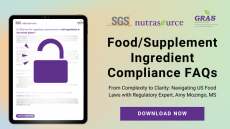Coffee linked to breast and colon cancer
Kathleen Philips, a spokesperson for Texas AgriLife Research, told NutraIngredients.com: “If the compound could be extracted and directed towards the colon tumor, it could be a new way to target this form of cancer.”
Additional studies are necessary to determine recommended consumption amounts, she added.
Act like a hormone
Dr Clinton Allred, AgriLife Research nutrition scientist, said that trigonelline has the ability to act like a hormone. "So there is a tie to cancer in the sense that we are looking at estrogen-dependent (breast) cancer cells. But that doesn't suggest that it would actually cause the disease. I don't believe there should be any concern about drinking coffee at this point," said Allred.
Allred’s report, published in the Journal of Nutrition, focuses on dietary compounds that can mimic the hormone estradiol – a primary hormone in women. His studies have examined how estrogen protects against the development of colon cancer.
Estradiol is one of three estrogen hormones, explained Allred. "There's a history of these compounds in crops such as soy. Soy has a number of different compounds that can mimic estradiol in several disease states some of which are good and some of which have the potential to be more deleterious-type effects."
Concentrations
Estrogen-dependent tumors in the presence of estradiol will grow faster, he said. "We haven't gotten as far as to suggest that if a woman had the disease that it would necessarily be a problem. But what we've proven is that the compound is estrogenic or can be at certain concentrations and doses," said Allred.
Trigonelline occurs in coffee beans at varying concentrations depending on the type of bean. "The more you roast a coffee bean, the less there is," Allred said. "But the most critical aspect is that when you do a water extract of ground coffee, which is basically how you make a cup of coffee. It does in fact come out in the water, so we know it is in a cup of coffee."















